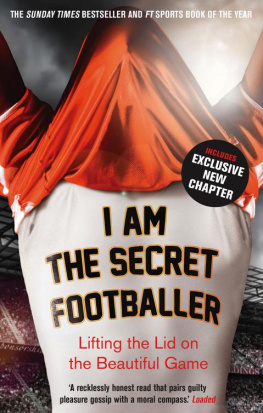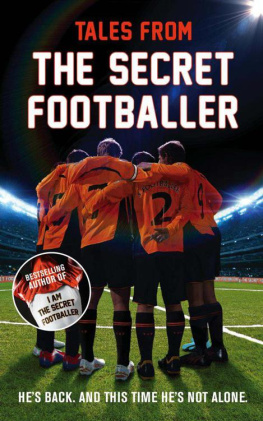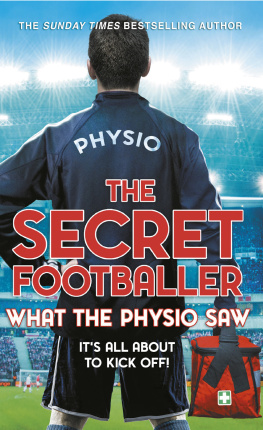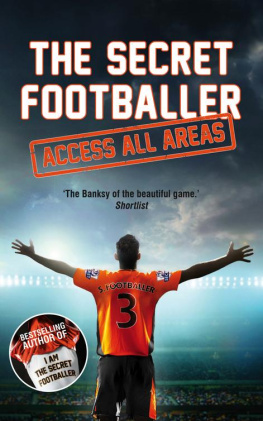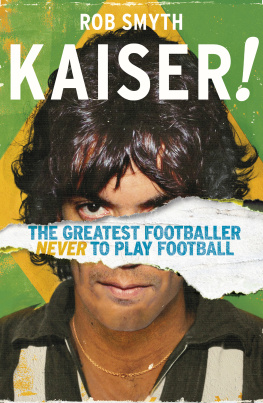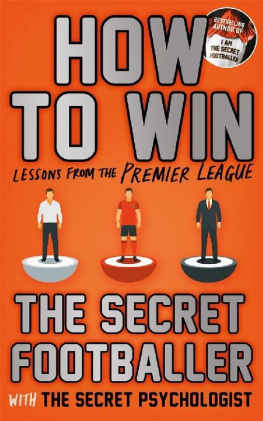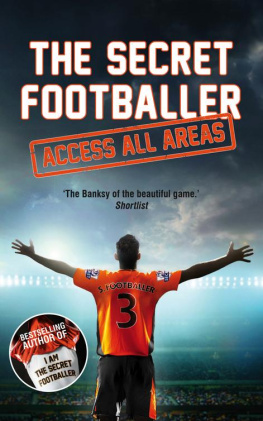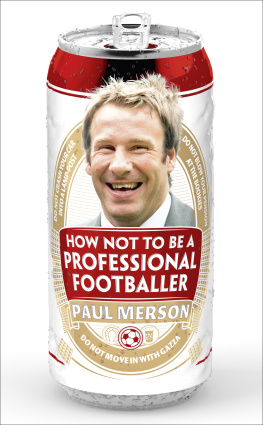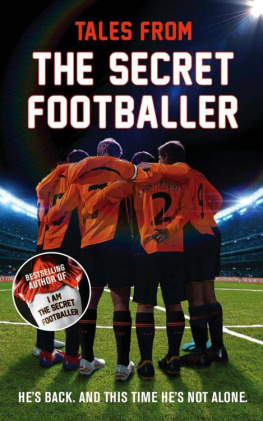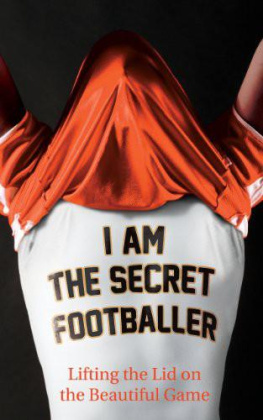This is better than any turgid football biography on the bookshelves and well worth seeking out
Not since the days of the great super-injuctions has the identity of an anonymous sports star caused as much speculation as that surrounding the Secret Footballer
Paul Johnson, Deputy Editor, Guardian News and Media
I am the Secret Footballer is both a declaration and a device. Since he wrote his first column for the Guardian two and a half years ago, there has been a sustained effort to unmask the Secret Footballer. Jigsaw identification has been attempted through forensic analysis of his pieces using names, games, clubs and matches. Fans forums debate in a knowledgeable and thoughtful way. There is a dedicated website at whoisthesecretfootballer.co.uk. Dozens of players have been identifi ed as him. According to those who think they have cracked a code, he plays for Blackburn, Sunderland, Fulham, Bolton, Wolves, Burnley, Newcastle, Leicester, Liverpool, West Ham, Everton, Spurs, Birmingham or Celtic. And a few others.
On his Wikipedia page the entry says he is English and has turned out for at least two Premier League clubs. The argument and search for clues are fun and understandable and it may be that some day he will decide to reveal himself as the author. But to write as he does, in such detail about the game and the people in it, would be impossible out in the open. His club(s) wouldnt like it, and would probably cite breach of contract. His agent wouldnt like it and his manager(s) would be somewhere on the other side of incandescent.
He tells us what it is like to score against Manchester United; about John Terry and his own reaction to being whacked in the face with an elbow: I kicked him as hard as I could across the back of the legs and he crumpled to the ground. He describes vividly the impact on life of a 1.4m-a-year contract (along with a 19,000-a-month mortgage) and how, in his words, it opens up a host of recreational possibilities. The sharks, the brown envelopes, the deals, the convoluted bonuses; malicious managers and understanding managers; supportive team-mates and those tortured and fearful of the end; the media, the women and the drink are all here, in a range that goes from the amusing to the terrifying.
But the Secret Footballer is different, and those differences that mark him out started early on in life. He describes his working-class background, playing in hand-me-down trainers. He came out of a loving and supportive family with his father encouraging him to read classics Shakespeare, Dickens, Joyce etc. He didnt get into football by the usual route and has struggled with the paradox of living a dream playing football but having to deal with the aggravations and frustrations off the pitch. The same tension shows with his continued determination not to leave his roots behind while developing a taste for fine wine, art and luxurious holidays. Those pressures built up to the point where he became insecure, reclusive and volatile; seeking help and put on medication after finding himself coming home from training and sitting in the same chair until it was time for bed. All of it is told as the reality of his life.
Some years ago, reading the Financial Times at weekends, the Secret Footballer enjoyed a column written anonymously by an estate agent that opened up a world many buyers and sellers have extensive experience of, but that, to those in the know, is very different: far more complex, potentially dangerous and duplicitous. The comparisons with football were only too obvious. Football, a game watched by millions, is digested and dissected in fine detail in print, on the radio, on TV and on the web. Managers and players give interviews, ex-pros write columns. Tactics, personalities, money and motives are debated endlessly. And yet what do we really understand? The Secret Footballers answer to that is simple: not that much.
So he had the idea for a column. We (Ian Prior, the Guardians sports editor and I) were approached and thought it had amazing potential. But we were worried: would he write honestly, what would he hold back, could he sustain themes, could he write at all? All those thoughts disappeared the moment the first piece arrived and he has got better and better ever since. This book, which originally saw the light of day in 2012, was his idea. It is all his own words, his own experiences , his own thoughts, his own emotions. He is a remarkable man.
Paul Johnson
London, August 2013
Life with the Secret Footballer
When I met him, he didnt have anything to his name. Nothing. Because of that, we talked a lot about what we wanted from our lives. He had a lot of ideas ideas that were far bigger than the town we lived in. But the thing that stands out from those early conversations was that he never once mentioned that he wanted to be a footballer. When I met his friends theyd tell me how good he was, but when I asked him about it he would always change the subject. It was clear even then that he didnt want anything to do with what he later described as the stigma of playing football. He wanted to be accepted for the things that he said or did.
When he moved to his first big club, it was obvious that they had far bigger plans for him than just playing on a Saturday. They wanted him as their poster boy and they would put him forward for interviews , corporate functions and sponsored events. There was nothing unusual in any of that, but things changed when various board members and directors wanted him to meet high-flying friends who had come to watch the game because they knew he wouldnt embarrass the club.
In the beginning he was quite willing to attend these engagements , but it soon became clear that something was wrong. He told me that all any of them wanted to ask him about was what so-and-so was like and what it was like to play against this player or that. That was a big turning point in his life: he was being used, so he rebelled.
He had been hoping that he could forge relationships with these men on a business level, or talk about the arts or some other shared enthusiasm. It became clear, however, that they were only interested in him as a footballer and that hurt him. From then on, he became incredibly rude if they wouldnt talk to him about what they did for a living. Hed cut them off mid-flow if they asked him about the game, and hed turn the whole conversation back on them so it appeared as if they were shallow for only wanting to talk about football. He upset a lot of very important people at the club, and I dont think he was ever the same from that point on in his career: he withdrew to a very dark place. But nobody dared to confront him because he was so important to the team on the pitch. They simply left him alone. And that is probably why nobody at that club picked up on his depression. It was hard to watch because he came to be known as difficult, or a problem player.
When his career turned the other way, it was hard to take. He took a huge amount of abuse from the fans but it was clear to anybody who knew him that he simply couldnt function properly on the pitch. I would say to him: Just tell them why you dont feel well, but he wouldnt, and then I woke up one morning to find that hed written about it instead. The next day he seemed better. He didnt want people to know he was ill he just needed to get it off his chest.
Playing high-level football has been the fulfilment of one of his ambitions, but I think he outgrew that a long time ago. He often tells me that he achieved what he set out to several years ago, and that he should have retired then.

